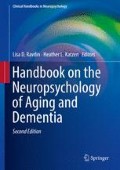Abstract
In diseases marked by anosognosia, a neurologically based unawareness of deficit, and otherwise good health, there is often literally no complaint for the neuropsychologist to address were it not for the observations and assistance of the multigenerational family system. Because we rely on the family as a rich, ongoing source of clinical information to guide dementia diagnosis and as the primary avenue for carrying out recommendations over the course of the disease, our clinical focus during the initial clinical interview and feedback session must necessarily include the patient’s extended family. This chapter will address strategies for harnessing and nurturing the insight, observations, and caregiving network of the multigenerational family system in the initial clinical interview and feedback sessions to facilitate assessment and management of dementia patients. Understanding the pressures and strengths of the family dynamics is complicated for clinicians as changing societal expectations and the diversity inherent in different cultures and unique family dynamics result in an almost limitless variety of presentations. Clinicians must therefore design our assessments to specifically ask families about dynamics, preferably in person, and be prepared to utilize that understanding to improve diagnostic accuracy and support the multigenerational family system as care plans are developed and carried out.
Access this chapter
Tax calculation will be finalised at checkout
Purchases are for personal use only
Notes
- 1.
Recall that all members of the family system are “listening in” when you speak directly to an individual family member in the room. The power of an overheard communication can be consciously utilized to send messages to other targeted family members without the friction of direct confrontation.
References
Winnicott DW. The child, the family, and the outside world. New York: Perseus Publishing; 1964.
Sholevar GP, Schwoeri LD. Textbook of family and couples therapy: clinical applications. Washington, DC: American Psychiatric Publishing Inc; 2003.
Cohen D, Eisdorfer C. Depression in family members caring for a relative with Alzheimer’s disease. J Am Geriatr Soc. 1988;36:885–9.
Eisdorfer C, et al. The effect of a family therapy and technology-based intervention on caregiver depression. Gerontologist. 2003;43(4):521–31.
Vitaliano PP, Zhang J, Scanlan JM. Is caregiving hazardous to One’s physical health? A meta-analysis. Psychol Bull. 2003;129(6):946–72.
Sutter M, et al. Linking family dynamics and the mental health of Colombian dementia caregivers. Am J Alzheimers Dis Other Demen. 2013;29(1):67–75.
E.g., Sansoni J, et al. Caregivers of Alzheimer’s patients and factors influencing institutionalization of loved ones: some considerations on existing literature. Ann Ig. 2013;25:235–46.
McGoldrick M, Gerson R. Genograms: assessment and intervention. New York: W.W. Norton & Company; 1985.
American Psychological Association. Guidelines on multicultural education, training, research, practice, and organizational change for psychologists. Am Psychol. 2003;58:377–402.
Postal K, Armstrong K. Feedback that sticks: the art of effectively communicating neuropsychological assessment results. New York: Oxford University Press; 2013. p. 56.
Connell CM, et al. Racial differences in knowledge and beliefs about Alzheimer disease. Alzheimer Dis Assoc Disord. 2009;23:110–6.
Levashina J, Campion M. (2007). Measuring faking in the employment interview: development and validation of an interview faking behavior scale. J Appl Psychol. 2007;92(6):1638–56.
Reisberg B, et al. The BEHAVE-AD assessment system: a perspective, a commentary on new findings, and a historical review. Dement Geriatr Cogn Disord. 2014;38:89–146.
Given C, et al. The caregiver reaction assessment (CRA) for caregivers to persons with chronic physical and mental impairment. Res Nurs Health. 1992;15:271–83.
Werner P, Karnieli-Miller O, Eidelman S. Current knowledge and future directions about the disclosure of dementia: a systematic review of the first decade of the 21st century. Alzheimers Dement. 2013;9:e74–88.
Ladson H, Franz C, Friend J. Pathways to dementia diagnosis: evidence for cross-ethnic differences. Alzheimer Dis Assoc Disord. 2004;18(3):134–44.
Turnbull Q, Wolf A, Holroyd S. Attitudes of elderly subjects towards “truth telling” for the diagnosis of Alzheimer’s disease. J Geriatr Psychiatry Neurol. 2003;16:90–3.
Bachman DL, Wagner MT, DePalma M, Spangenberg KB, Hendrix SA. Caregiver attitudes about patients being told they have Alzheimer’s disease: before and after truth disclosure. J Clin Geropsychol. 2000;6(4):309–13.
Cornett PF, Hall JR. Issues in disclosing a diagnosis of dementia. Arch Clin Neuropsychol. 2008;23:251–6.
Byszewski A, et al. Dementia diagnosis disclosure: a study of patient and caregiver perspectives. Alzheimer Dis Assoc Disord. 2007;21(2):107–14.
Postal K, Armstrong K. Feedback that sticks: the art of effectively communicating neuropsychological assessment results. New York: Oxford University Press; 2013. p. 89–114.
Bott N, Sheckter C, Milstein A. Dementia care, Women’s health, and gender equity: the value of well-timed caregiver support. JAMA Neurol. 2017;74(7):757–8.
Alzheimer’s Association. 2016 Alzheimer’s disease facts and figures. Alzheimers Dement. 2016;12(4):459–509.
Anetzberger G, et al. A model intervention for elder abuse and dementia. Gerontologist. 2000;40(4):492–7.
Morin R. The demographics and politics of gun-owning households. Retrieved from: http://www.pewresearch.org/fact-tank/2014/07/15/the-demographics-and-politics-of-gun-owning-households.
Spangenberg K, et al. Firearm presence in the households of patients with Alzheimer’s disease. J Am Geriatr Soc. 1999;47(10):1183–6.
Author information
Authors and Affiliations
Editor information
Editors and Affiliations
Rights and permissions
Copyright information
© 2019 Springer Nature Switzerland AG
About this chapter
Cite this chapter
Postal, K. (2019). The Multigenerational Family System in Dementia: Assessment and Feedback. In: Ravdin, L.D., Katzen, H.L. (eds) Handbook on the Neuropsychology of Aging and Dementia. Clinical Handbooks in Neuropsychology. Springer, Cham. https://doi.org/10.1007/978-3-319-93497-6_9
Download citation
DOI: https://doi.org/10.1007/978-3-319-93497-6_9
Published:
Publisher Name: Springer, Cham
Print ISBN: 978-3-319-93496-9
Online ISBN: 978-3-319-93497-6
eBook Packages: Behavioral Science and PsychologyBehavioral Science and Psychology (R0)

